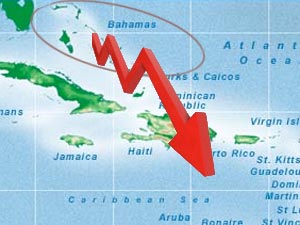
Wall Street dealt yet another blow to The Bahamas Monday by revising the country’s financial outlook from stable to negative, insisting that the government’s fiscal profile continues to weaken.
In the latest report from Standard & Poor’s (S&P), the international credit rating agency issued a warning that a downgrade could occur if the Progressive Liberal Party (PLP) administration fails to craft a medium-term plan to reign in the country’s rising debt.
For now, S&P affirmed its “BBB/A-2” sovereign credit rating and “BBB+” transfer and convertibility assessment on The Bahamas.
“The government deficit, instead of peaking and starting to decline, rose even further in the fiscal year ended June 2012,” the report stated.
“Capital expenditure cost overruns (especially on the New Providence roads project) and continued sluggish growth in recurrent revenue pushed the general government deficit to an estimated more than 7 percent of GDP.”
S&P further noted that it considered $86 million in capital revenue as “below-the-line” deficit financing. This warning from S&P could be just a precursor to another downgrade.
Last November, the ratings agency downgraded the country’s sovereign credit rating for the second time in two years, with long-term credit declining from “BBB+” to “BBB”.
In August 2011, Moody’s revised the country’s outlook from stable to negative, while affirming the A3 government bond ratings.
It all adds up to a worrying trend on the country’s fiscal position.
S&P reported yesterday that it expects the general government deficit to be around 6.7 percent of GDP for the fiscal year ending June 2013.
“We don’t expect the overruns associated with capital projects to moderate until the following fiscal year (ending June 2014), when the deficit could fall towards 4.4 percent of GDP,” the report said.
Michael Halkitis, the state minister of finance, did not dispute the majority of findings by the ratings agency. In fact, he called the outcome “expected” given the high cost overruns related to capital works and their impact on the deficit.
“We have to address the under-performance of revenue, we have to address the issue of growing the economy, and we have to contain expenditure. And we are very aggressively addressing that,” he said.
“That is the right formula to get us onto the right track.”
S&P felt, however, the May election and the current agenda of the PLP warrants the negative outlook. It noted that there is little room for near-term adjustments, as it “wants to advance some of its own new programs”.
One of the more controversial new programs is the Mortgage Relief Plan, which attracted significant negative attention from Moody’s. That program is now expected to be capped at approximately $10 million.
The new government has also engaged the Bahamas Telecommunications Company (BTC) in negotiations to “buy back” a majority stake from Cable and Wireless Communications (CWC).
Top among the concerns of S&P is The Bahamas’ persistent problem with economic diversification and new streams of revenue.
The absence of income tax or value-added tax creates a “comparatively low and narrow revenue base”.
The government has shown a willingness to remedy the situation, most notably through the upcoming National Symposium on Tax Reform from October 25 to October 26 at The College of The Bahamas.
That said, S&P said it will likely take years for such reforms to come into force.
“A reform to broaden The Bahamas’ tax base would seemingly take several years to conceptualize, pass and implement,” it said.
“In the interim, deficits are likely to remain at higher than anticipated levels, absent more significant expenditure adjustment or boost to growth.”
The rating agency’s report projects general government debt to rise from 36 percent of GDP in 2011 to 41 percent of GDP in 2012, and up to 47 percent in 2013 – 2014.
The interest burden now represents about 13 percent of general government revenues this year.
If the country stays on the same path, S&P is of the opinion that The Bahamas indeed faces another downgrade. Ratings could stabilize, it added, if the government “takes a more proactive policy response to reduce debt or if the Commonwealth’s economic prospects strengthen”.
Jeffrey Todd,
The Nassau Guardian



